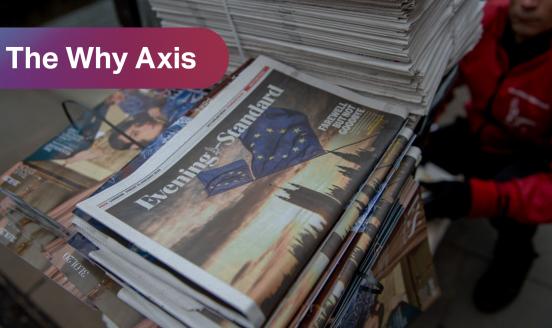Turbulence Ahead for the City of London
The city of London has been Europe’s dominant financial center since the 18th century, and its prominence has been especially marked in the decade before the current financial crisis. The city has succeeded by combining the intermediation of global financial imbalances, channeling Asian and Middle Eastern savings toward investment products in the West, and increasing the concentration of wholesale financial services for the entire European financial system. Domestically, it was seen as the goose that laid golden eggs for the United Kingdom’s economy, and was rewarded with generous tax treatment and a light-touch regulatory regime rationalized as “risk based.” In Brussels, the city became an objective ally of the European Union institutions in their drive to complete cross-border market integration, enabling it to play an important part in shaping EU-level financial legislation while largely retaining its own autonomy. In these times, the city had it good.
But since last year the financial crisis has changed the atmosphere well beyond the direct damage it has caused to many financial firms. The crisis has produced a tangible risk of financial refragmentation along national lines, both globally and within the European Union, which would disproportionately harm leading financial centers such as London while probably also decreasing the efficiency of capital allocation overall. Moreover, we are seeing a strong demand in public opinion for more prescriptive regulation.
At European level the postcrisis environment has led to legislation on rating agencies, passed earlier this year, and by the currently debated directive on hedge funds and private equity funds. In the United Kingdom spectacular banking debacles and bailouts—amplified by the prospect of an election next spring—have exacerbated the popular backlash against bankers. Politics apart, the financial collapse has been such that some sort of reregulation appears indeed justified to strike the right balance of growth and stability, even though the exact form it should take remains far from settled.
This situation leads to a remarkable double shift. On the one hand, the UK government is likely to become more Euroskeptic with the probable victory of the Tories, who have signaled their willingness to fight any new initiative from Brussels. On the other hand, the city itself, which until now had been determined to “keep Brussels at bay,” becomes more dependent on EU institutions to guarantee the international openness of the European financial system—a key source of its prosperity. This has not yet coalesced in a clearly identifiable collective position at the city, but key players there seem to be increasingly open-minded about the possible devolution of regulatory and supervisory powers to the EU level, if that is the price to pay to sustain market integration.
The furor about oversized bankers’ bonuses, which appear to be returning to precrisis “business as usual,” has masked these momentous undercurrents. But they are apparent in a series of unprecedented and surprising recent developments. In June, the UK government accepted the creation of EU-level financial supervisory authorities, which it had consistently blocked for more than a decade before. In July George Osborne, the Tory shadow chancellor, called for the dismantling of the Financial Services Authority (FSA), a step that would dramatically weaken the country’s main financial regulator in the middle of a major crisis. In August the FSA’s own head, Adair Turner, advocated a reduction of the size of the UK financial industry, possibly through a tax on financial transactions. In October Mervyn King, the Bank of England’s governor, made a speech in favor of breaking up the country’s largest banks for the sake of financial stability. More recently Fitch, a major ratings agency, has signaled the possibility of the United Kingdom losing its AAA credit rating.
Whatever one thinks of their individual merits or shortcomings, each of these positions was unthinkable in precrisis times. Together they justify the city’s growing perception of “political risk,” an environment for financial services that no longer offers its famed stability and predictability. In an extreme aspect of this, several hedge funds have recently relocated from London to Switzerland. More generally the combination of the Tories’ Euroskepticism, the unpopularity of financiers, the city’s interest in cross-border integration, together with a new European Commission in Brussels and the growing defensiveness of other national governments, portend major turbulences in the months and years ahead.
The stakes in this are high not only for the United Kingdom, but for Europe as a whole. Much attention on the continent is devoted to whether rivals such as Frankfurt or Paris may encroach on London’s dominance, but the larger question is whether the European Union will keep a global financial hub on its territory. For all the justified blame that has been heaped on the city in recent times, Europe may well be weaker without it. There needs to be a serious policy debate about the city’s role and prospects, which—given the crisis and its multifaceted political developments—can no longer be taken for granted.



